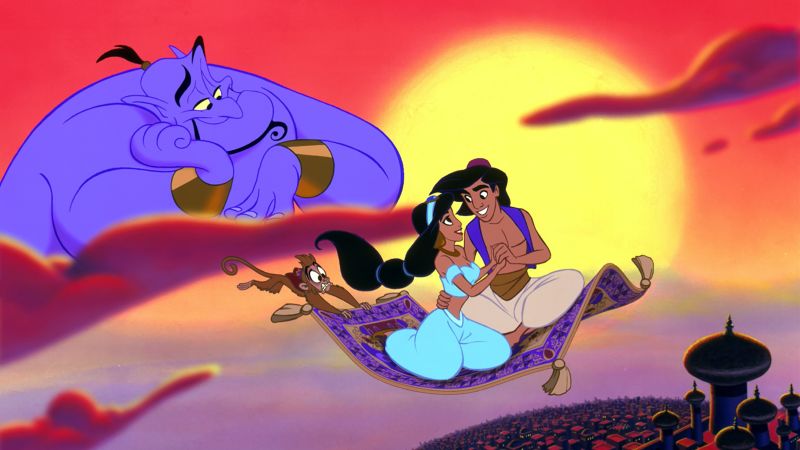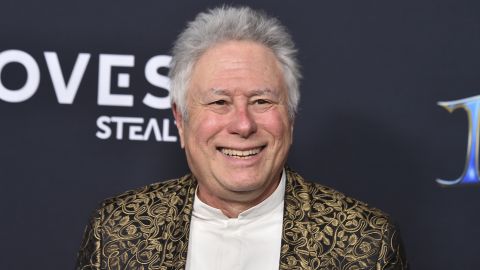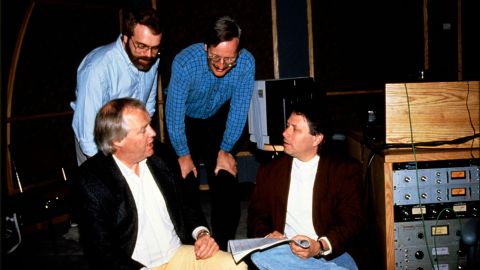
CNN
—
It might be hard to believe, but this holiday weekend marks 30 years since the release of “Aladdin” – the animated classic that set the stage for multiple sequels, a live-action reimagining released in 2019 and even a Broadway musical. To mark the occasion, eight-time Oscar-winning composer Alan Menken, who nabbed two statuettes for his work on the movie, spoke with CNN about his memories from the making of the prescient classic.
While the film is beloved by many – not only for how it showcases the vocal prowess of the late Robin Williams – Menken says none of it would have been possible without his late lyricist partner, Howard Ashman, whom he called “not replaceable.”
The accomplished composer also reflects on how Disney, as a studio, dealt with the portrayal of the Far East in the film and how a previous in-development version was in fact shelved due to concerns that predated cancel culture by decades.
This conversation has been condensed and lightly edited for clarity.
CNN: When it came to the development of “Aladdin,” was there a sense of hesitation at Disney in how to tell this story?
Alan Menken, composer: “Aladdin” was started almost simultaneously with “(The Little) Mermaid.” While we were still working on “Mermaid,” we had started “Aladdin,” had a whole take on it and it was shelved. Part of the (reason) it was shelved, it was very irreverent, even more irreverent than it became, and there was a lot of concern about how it would affect Arab sensibilities.
I remember when we were starting to do “Aladdin,” (we were) thinking about how (we) really wanted it to be a fun wink at the Hollywood take on the ‘Mysterious East’ and all of that because it had that kind of, I wanted it to have that Bob Hope/Bing Crosby road picture kind of tone to it, or the crazy wacky Fleischer cartoons.
We knew we were walking a line. Wokeness didn’t actually emerge out of nothing, and it’s not like it wasn’t there. Anytime you dealt with a stereotype on these pictures, it was very, very, very carefully scrutinized. Disney was not about to (be) caught being PC-insensitive.
Editor’s note: Today, when viewers click on “Aladdin” on Disney+, a message appears first which reads in part, “This program includes negative depictions and/or mistreatment of people or cultures. The stereotypes were wrong then and are wrong now. Rather than remove this continent, we want to acknowledge its harmful impact, learn from it and spark conversations to create a more inclusive future together.”
CNN: I remember at the time, one of the first lyrics in the opening song of the movie, “Arabian Nights” (“Where they cut off your ears if they don’t like your face”), had to be changed for fear of it being insensitive. Did that serve as a hint of things to come, in terms of today’s standards of political correctness, etc.?
Menken: That was changed as soon as the picture came out.
And so we – Howard was gone – so I rewrote it to, “Where it’s hot and immense and the heat is intense, it’s barbaric, but hey, it’s home.” Now, even “barbaric” as an adjective for heat, still was overly sensitive. So for the live action movie, when Benj Pasek and Justin Paul were my lyricists, that was adjusted as well.
The really irreverent lyrics were in “Arabian Nights.” Because they were setting up a world and we were saying, “This is our tone. We’re winking at everything and making fun.” We were making fun of a genre, but making fun of a genre clearly can bleed over to making fun of a people.

There’s always a lot of back and forth about stereotype, and whether it’s the right stereotype and whether, possibly, it could be offensive or whatever. But that (lyric change) was the first spot where we actually said, ‘Okay, we gotta change that.’
Specifically about making the movie and working with the actors: You have previously spoken about what it was like to work with the late Robin Williams. Any other memories you care to share?
Menken: In the (recording) room, Robin (was) a serious artist. He wanted to learn every note of “Friend Like Me” and “Prince Ali,” and so we rehearsed it dutifully. I think he was a little sore from being in the harness on (the 1991 Steven Spielberg movie) “Hook” all day.
Then of course when we got to the recording sessions, and after he delivered faithfully exactly what I wanted from the song – that kind of Fats Waller style of singing the songs – then everyone said, “Okay, Robin, can you just go have fun?”
And… that was where you just went nuts, because it was Robin “on.” And Robin “on” was incredible. Robin was actually a very sensitive, nice, sweet man. He was amazing to work with.
What about Gilbert Gottfried, who died this year?
Menken: Gilbert did not contribute musically (to the film). But from the press junket the film on for the last 28 years, or 29 years, Gilbert would always (say), “Where’s my song? You never gave me a song!”
You know, there’s always a big gap between people’s persona and who they are. He was a sweet, nice, unassuming guy, and gentle and sensitive and fun to talk to and a little nerdy and all the things, and then when he is “on,” you know, all this stuff would “blaaaaa!!!” out of him. And in animation there’s many of those experiences. There are hilarious anecdotes about people when they’re “on,” and it’s just amazing.
As you mentioned, you began work on this film with your longtime lyricist collaborator Howard Ashman, but then continued working on it with Tim Rice after Ashman’s death in March 1991. How do you look back on that time now, working with Ashman?
Menken: He was just brilliantly smart, intuitive, had an amazing grasp of how we mix styles and vocabularies from our culture, from other cultures in a really hip and exciting and fun way. And all of the serious messages were kind of in subtext, but brilliantly in subtext. And that started with our stage shows, with “Little Shop of Horrors” in particular.

And Howard was a very, very fully developed jack of (all trades) – lyricist, book writer, director and producer. He really was just an amazing amalgam of so many gifts and talents.
What about how the animated “Aladdin” has served as a basis for so many successful iterations that have followed, including the long-running Broadway show and the billion-dollar-grossing live-action film?
Menken: Well, in the case of first (2017’s live-action “Beauty and the Beast”), then “Aladdin,” and now “Mermaid” (to be released next year), these really are not so much a progression…as really the animated (film) is the Rosetta Stone, and it’s just spokes on a wheel that come off of that – and that’s not conceptually on my part. It’s just the way the studio operates, the way each division operates. And it also allows the director of each iteration to kind of have a greater influence over how it differs from the animated (version).
With Broadway, I knew my agenda was I want to get in as many of the songs that Howard originally wrote as possible, and I leaned heavily on everybody to make sure the storyline reflected that. And I think it was a smart move. It was not like just a sentimental gesture towards my late collaborator, but the mystique of Howard’s work and the brilliance of his work is one of the biggest draws for our projects.
